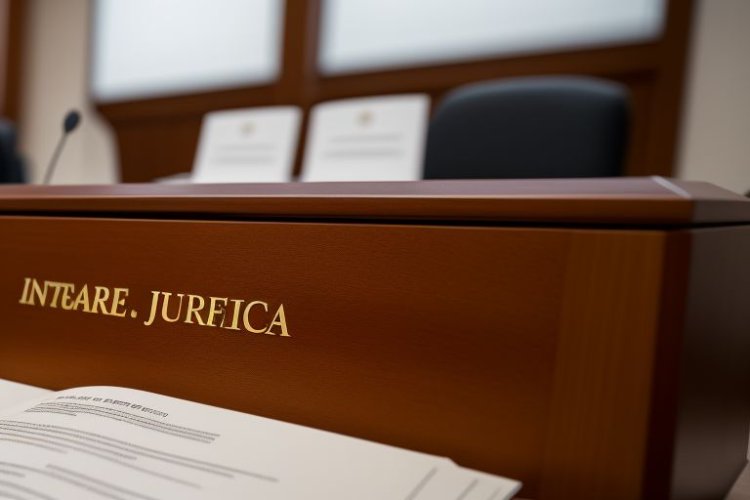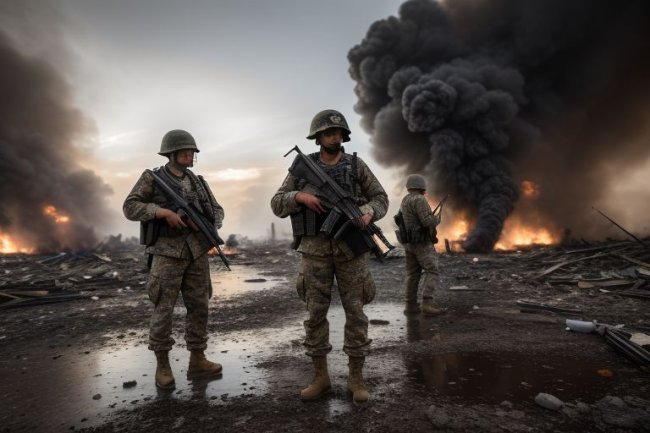International Peace Court
The idea of an International Peace Court arises as a glimmer of hope and an embodiment of humanity's collective desire for long-lasting tranquility in a world full of conflicts and difficulties. The International Peace Court is a radical idea in international law that aims to break down sovereign boundaries and promote a culture of peace and non-violence.


The roots of this visionary institution can be traced back to the devastating consequences of two world wars within three decades and the profound realization that the existing mechanisms for conflict resolution were insufficient to prevent such catastrophic events. In response to this urgent need for a transformative solution, the United Nations and its auxiliary, the International Court of Justice, were established to usher in an era of international security and cooperation.
However, the elusiveness of true global peace continues to be a haunting reality. The emergence of nuclear weapons, with their unfathomable potential for destruction, is a stark reminder of the ever-present threat of conflict. The limitations and challenges faced by existing international mechanisms in addressing complex conflicts have sparked a compelling call for an institution dedicated solely to promoting peace and non-violence on a global scale.
The International Peace Court represents a paradigm shift in the pursuit of justice and accountability. Going beyond the constraints of state consent, this envisioned court would possess the authority to hold nations accountable for aggression, arbitrate disputes, and seek diplomatic solutions to prevent conflicts from escalating into war. Grounded in the collective will of the international community, this institution would symbolize humanity's unwavering commitment to forging a path toward a world free from the horrors of armed hostilities.
This creative vision of an International Peace Court encompasses more than just a judicial body; it becomes a platform for dialogue, empathy, and understanding among nations. Encouraging diplomacy and cooperation seeks to reshape the narrative of international relations, paving the way for collaborative solutions to global challenges. The court aspires to be a bastion of enlightenment, inspiring a cultural transformation where the pursuit of peace takes precedence over the pursuit of power.
However, the road to establishing the International Peace Court has obstacles. The complexities of geopolitics, entrenched rivalries among nations, and skepticism about the effectiveness of international mechanisms present formidable challenges. Yet, the urgency to prevent catastrophic conflicts and secure a sustainable global future calls for unwavering determination and bold steps toward realizing this visionary institution.
In this chapter, we embark on a journey of innovation, exploring a realm where the dreams of lasting peace are not relegated to the realm of aspiration but become tangible possibilities. As we delve deeper into this concept, we shall critically examine its potential impact on global affairs, its legal framework, and the transformative role it could play in shaping a world where the triumph of diplomacy and understanding replaces the devastation of war. The International Peace Court beckons us to rise above the shadows of the past and step into a future where peace becomes a shared endeavor of humanity, transcending boundaries and uniting nations in the noble pursuit of a more harmonious world.
Establishing A Specialized Court For Peaceful Dispute Resolution
Conflicts and war have left a path of destruction, misery, and irreparable loss throughout human history. The revolutionary idea of an International Peace Court was born out of the urgent need for a radical solution to stop the repetition of such disastrous tragedies. This ground-breaking institution hopes to promote a culture of peace and non-violence worldwide by going beyond the constraints of conventional conflict resolution procedures.
At a critical juncture in history, as the world grapples with complex geopolitical dynamics and escalating conflicts, establishing an International Peace Court is imperative. The existing mechanisms for conflict resolution have proven insufficient to prevent the outbreak of armed hostilities, leading to devastating consequences for humanity. The emergence of nuclear weapons, with their unimaginable potential for destruction, is a grim reminder of the urgent need for a more effective and specialized approach to peaceful dispute resolution.
The potential impact of the International Peace Court on global affairs is profound. By transcending the barriers of sovereignty, this court would possess the authority to hold nations accountable for acts of aggression and human rights violations. Such accountability would serve as a deterrent to potential aggressors and establish a foundation for building lasting peace and reconciliation among conflicting parties. The court's impartiality and legitimacy would garner trust from nations across the globe, facilitating the resolution of disputes that have long plagued the international community.
The legal framework of the International Peace Court would pave the way for a new dimension of international law. Its creation would require comprehensive and well-defined statutes that govern its operations, jurisdiction, and enforcement mechanisms. The court would have the authority to rule on cases involving international disputes, human rights breaches, and international law infringements. It would serve as a custodian of justice, ensuring that justice, equity, and respect for human dignity guide its actions.
The International Peace Court's transformative role cannot be overstated. It would symbolize a shift from the traditional mindset that accepts war as an inevitable outcome of state disputes. By prioritizing diplomacy, dialogue, and peaceful negotiations, the court would encourage nations to seek alternative avenues for conflict resolution. This cultural shift towards non-violence would have far-reaching implications, fostering a world where disputes are settled through cooperation and compromise rather than confrontation and hostility.
Despite its promise, establishing an International Peace Court would face significant challenges. Given the complexities of geopolitical interests and long-standing rivalries, obtaining the unanimous support of all nations for such a transformative institution might prove difficult. The court's effectiveness would also rely heavily on the willingness of nations to submit to its jurisdiction and comply with its rulings. Overcoming these obstacles would necessitate a collective commitment from the international community to embrace the court as a powerful instrument for global peace.
Collaborative efforts between the court, the United Nations, and other international organizations would be paramount to harness the full potential of the International Peace Court. Partnerships with regional bodies, non-governmental organizations, and civil society groups would enhance the court's reach and impact. By working together, these entities can create a robust network of support and advocacy for peaceful dispute resolution, further strengthening the court's position as a transformative force for global peace.
The establishment of a specialized court for peaceful dispute resolution, the International Peace Court, represents a bold step towards shaping a world where the triumph of diplomacy and understanding replaces the devastation of war. With its potential impact on global affairs, robust legal framework, and transformative role in fostering a culture of peace, the court embodies humanity's unwavering commitment to preventing armed conflicts and promoting harmonious coexistence. While challenges may lie ahead, the promise of sustainable peace and the aspiration for a brighter future call for relentless efforts in realizing the vision of an International Peace Court – a symbol of hope, justice, and a world united in its pursuit of lasting peace.
Jurisdiction And Scope Of The International Peace Court
Amidst the complexities of international relations, the world witnesses a continuous emergence of conflicts and disputes, inflicting immense suffering and shaking the foundation of stability. To confront this urgent challenge head-on, the concept of an International Peace Court has risen, offering a glimmer of hope for a peaceful resolution and global accord. Envisioned as an unbiased and authoritative entity, the International Peace Court aspires to adjudicate matters of international conflict, fostering a culture where peace and non-violence thrive.
In the intricate web of geopolitical interactions, disputes can arise for diverse reasons, be it territorial claims, resource conflicts, or human rights violations. These conflicts, when left unresolved, possess the potential to escalate into destructive wars and lasting animosities. The idea of the International Peace Court has drawn attention as a compelling approach to address the core causes of conflicts and create a platform for peaceful interaction in recognition of the need for a framework to prevent such hazards.
The International Peace Court originates in the aftermath of both catastrophic World Wars. A comprehensive reevaluation of the tenets guiding international relations was required due to the enormous toll of military conflicts. As a result, the United Nations (UN) and the International Court of Justice (ICJ), sometimes referred to as the World Court, were established in 1945. The ICJ was established as the UN's judicial branch with the primary duty of mediating international disputes. This important development laid the groundwork for the International Peace Court, an organization dedicated to promoting peaceful coexistence and preventing the horrors of war.
The jurisdiction of the International Peace Court encompasses a broad spectrum of conflicts and disputes between nation-states. However, parties must willingly submit to the court's jurisdiction, underscoring their commitment to resolving conflicts through peaceful measures. Territorial claims, border disputes, resource conflicts, and disagreements over international treaties may all be the genesis of the issues brought before the court. Additionally, the court has the power to deal with human rights abuses nations have perpetrated against people or groups within their jurisdiction, reiterating its commitment to maintaining human dignity and defending fundamental rights.
Additionally, the court's jurisdiction includes prosecuting crimes against peace, such as aggression and similar offenses, underscoring its role in deterring acts of hostility and upholding the principles of international law.
In terms of scope, the International Peace Court employs various mechanisms to promote peaceful dispute resolution. The court actively encourages parties to engage in diplomatic settlements, emphasizing the importance of dialogue and negotiation in resolving conflicts. Furthermore, the court may engage in mediation and conciliation efforts to facilitate amicable settlements, offering an alternative approach to adversarial proceedings. Additionally, the court has the authority to provide authoritative interpretations of international law and improve legal clarity by issuing advisory opinions on legal issues presented to it by recognized UN organizations and specialized agencies.
Detailed legislation that describes the International Peace Court's jurisdiction, membership, and processes governs its operations. The UN General Assembly and Security Council pick the court's unbiased, experienced justices, assuring consistency and impartiality in its rulings.
Proceedings before the court are conducted with due process, guaranteeing equitable treatment of all parties involved. The court applies established legal standards, including principles of international law and treaties, to guide its rulings.
The potential impact of the International Peace Court on global affairs is profound and multifaceted. By providing a forum for peaceful dispute resolution, the court significantly contributes to conflict prevention and resolution, aligning perfectly with the UN's primary objective of maintaining international peace and security. Moreover, the court's authority to address human rights violations emphasizes its role in promoting accountability for state actions that violate fundamental human rights, thus reinforcing the global commitment to upholding human dignity. In this regard, the court plays a crucial role in strengthening the rule of law at the international level, as its authoritative rulings and legal opinions contribute to the development and consistent application of international law.
In the turbulent world of international relations, establishing an International Peace Court symbolizes hope and aspiration for a world where conflicts are resolved through diplomacy and mutual understanding. Its extensive jurisdiction and broad scope exemplify its commitment to promoting global harmony, and its impartiality, legal framework, and transformative potential underscore its role as an essential pillar in the quest for a harmonious and peaceful world. As nations grapple with complex challenges, the International Peace Court remains an unwavering ally in pursuing collective security and peaceful coexistence.
The transformative potential of the International Peace Court extends beyond the realm of resolving conflicts between nation-states. As part of its duties, the court must also redress breaches of human rights, promote accountability, and preserve the ideals of justice and equality. The court empowers victims and strengthens the idea that no organization—regardless of size or power—is above the law by giving individuals and organizations a forum to demand justice for human rights violations perpetrated by nations.
In this context, the International Peace Court plays a pivotal role in ensuring that perpetrators of gross human rights violations face legal consequences for their actions. This aspect contributes significantly to the global promotion and protection of human rights, reinforcing that the international community places paramount importance on safeguarding human dignity and fundamental freedoms.
Moreover, the court's jurisdiction over crimes against peace serves as a crucial deterrent against acts of aggression and military aggression between states. The court sends a clear message that aggression will not go unpunished by prosecuting those responsible for inciting armed conflicts and initiating acts of aggression. This aspect of the court's jurisdiction is closely aligned with the principles enshrined in the UN Charter, which emphasize the importance of preventing the scourge of war and promoting peaceful relations among nations.
The International Peace Court's far-reaching impact on global affairs extends to developing and enforcing international law. As an authoritative judicial body, the court's rulings and advisory opinions contribute significantly to the evolution of international law and its consistent application. The court's interpretations of international law clarify complex legal issues, guiding states and international organizations in their conduct and interactions.
In this regard, the International Peace Court plays a transformative role in shaping the international legal framework, promoting coherence, and ensuring consistency in applying legal principles. As states and entities adhere to the court's rulings, a strong precedent is set for the future, fostering a more predictable and stable international order.
Strengthening the rule of law worldwide depends on creating an International Peace Court. As an unbiased judicial institution, the court offers a forum for the amicable settlement of disagreements and conflicts, lowering the likelihood of hostility and armed aggression.
The court's commitment to upholding international law and promoting the peaceful settlement of disputes is fundamental to maintaining stability and preventing the recurrence of devastating conflicts.
The court's transformative impact on global affairs lies in its jurisdiction, scope, and trust and the legitimacy it gains from the international community. The court's impartiality, transparency, and adherence to due process are essential to building trust among states and ensuring their voluntary submission to the court's jurisdiction. This trust is critical for the court's effectiveness and authority, as it allows it to exert its influence in a manner that promotes peaceful resolution and respect for international law.
However, as with any institution, the International Peace Court faces challenges that must be navigated to fulfill its mission effectively. One of the key challenges lies in securing universal acceptance and participation from all states. While most UN member states are signatories to the ICJ's statute, there are still some notable exceptions. Notable countries such as the United States, China, and Russia have not accepted the compulsory jurisdiction of the ICJ, which limits the court's ability to address disputes involving these major powers.
Furthermore, the court's jurisdiction relies on the voluntary submission of states to its authority. While the UN Charter encourages states to settle their disputes through peaceful means, there may be instances where parties choose to pursue alternative courses of action, such as armed conflict or other unilateral measures. In such cases, the court's ability to intervene may be limited, and its potential impact on conflict resolution may be curtailed.
Another challenge the International Peace Court faces lies in enforcing its rulings and decisions. As an international court, the ICJ does not have its enforcement mechanisms, relying instead on the cooperation of states to implement its decisions. In cases where states refuse to comply with the court's rulings, the court's effectiveness in resolving disputes may be undermined, and its authority may be called into question.
To address these challenges, the International Peace Court must continue emphasizing its impartiality and effectiveness as a neutral arbiter of international disputes. The court must also build trust and cooperation with states that have not yet fully embraced its jurisdiction, engaging in diplomatic efforts to encourage their voluntary submission to the court's authority.
Additionally, the court should explore mechanisms to enhance the enforcement of its decisions, such as cooperation with regional organizations and the UN Security Council. The court's ability to collaborate with other international entities could strengthen its impact on conflict resolution and promote peace and security.
Moreover, the court should proactively raise awareness of its role and mandate among the international community. By better understanding its functions and benefits, the court can garner greater support from states and civil society, further bolstering its legitimacy and influence.
Establishing an International Peace Court represents a significant milestone in pursuing global peace and conflict resolution. The court's jurisdiction and scope encompass many disputes, and its transformative impact on global affairs is far-reaching. By providing a platform for peaceful dispute resolution, promoting accountability for human rights violations and upholding the principles of international law, the court serves as an indispensable instrument for fostering a world where conflicts are resolved through diplomacy and understanding.
However, the court faces challenges that must be addressed to realize its potential fully. Universal acceptance and participation from all states and effective enforcement mechanisms are crucial aspects that require careful consideration. As the International Peace Court continues to evolve and adapt, it holds the promise of shaping a world where the triumph of diplomacy and peaceful resolution replaces the devastation of war. The court's commitment to impartiality, fairness, and the promotion of international law will undoubtedly play a pivotal role in the quest for a harmonious and peaceful world, making it a beacon of hope in a turbulent world.




















